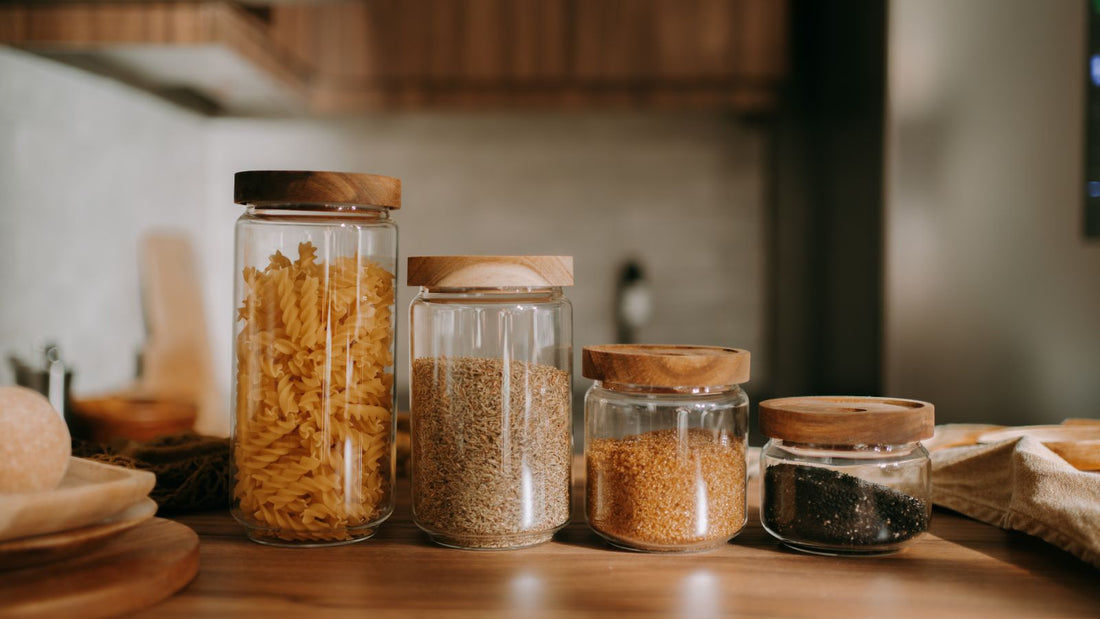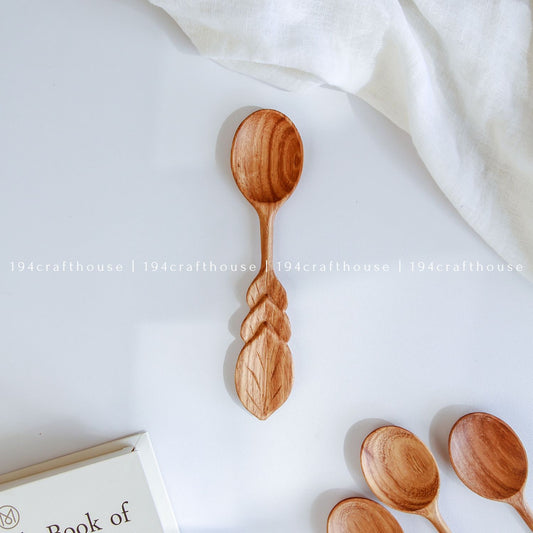Glass storage jars are a versatile way to store and sort a variety of items, from grains and nuts, cereals, spices and herbs, to other foods in your pantry station, and homemade crafts.

A great storage method that helps reduce kitchen waste is cleaning and reusing glass jars. Proper cleaning of glass jars food storage is therefore important to ensure optimum safety, hygiene and longevity.
This article explains why cleaning glassware is so important and provides helpful steps and tips on how to effectively clean glassware.
The Benefits of Using Glass Jars for Food Storage
The advantages of glass storage jars are clear: it’s sustainable, infinitely recyclable, reusable, and refillable. It is beautiful and has no synthetic chemicals, making it safe to store food and beverage in. That's why consumers love it.

Glass is made from naturally occurring ingredients abundant in nature, which are 100% recyclable and can be recycled endlessly with no loss in quality or purity.
Why Do We Need To Clean Glass Jars Properly?
Health And Safety Concerns
Glass storage jars can pose health and safety risks if they are not properly cleaned. Residual food particles left in jars can lead to bacterial contamination, potentially causing foodborne illnesses.
Remove Residues And Odors, Preserving Food Quality
Cleaning glass jars plays a vital role in preserving the quality and flavor of stored food items. By removing any residual substances, the risk of cross-contamination is minimized. This is particularly important when storing different types of foods, as flavors and aromas can easily transfer between containers. Proper cleaning also helps extend the shelf life of perishable items.
Maintaining Aesthetic Appeal
Cleaning glass food containers properly can prevent stains, discoloration, and unpleasant odors from developing over time. Whether you are using glass jars for storing homemade preserves or displaying decorative items, maintaining their pristine appearance enhances their overall presentation.
A Step-by-Step To Clean Glass Storage Jar
This step-by-step guide will provide you with easy-to-follow instructions to ensure your glass jars food storage are impeccably clean and ready for storing your favorite ingredients.
Step 1: Preparing And Gathering Supplies
Before you begin, gather the tools you'll need: a non-abrasive sponge or brush, mild dish soap, vinegar, warm water, and a clean towel. We should select non-toxic cleaning solutions to ensure food safety.

Next, empty the contents of the glass jars, discard any rotten or expired items, and remove any trash or leftovers.
Other parts such as lids and seals are then removed and cleaned separately.
Step 2: Cleaning Glass Jars

Depending on how dirty your glass storage jars are, there are two common cleaning techniques.
- Mild Dish Soap And Warm Water Solution
Rinse the glass storage jars well with warm running water. Gently scrub the inside and outside of the jar with a non-abrasive sponge or brush. Take the time to scrub all surfaces to remove any remaining residue or dirt.
Pay special attention to difficult areas such as stubborn dirt and residue, narrow necks, and grooves. These areas tend to accumulate debris and require thorough cleaning.
Check again every corner and cranny to see if any food residue or debris has been removed.
- Vinegar And Water Solution
Make a soaking solution by mixing equal parts vinegar and water in a clean sink or basin. Dip the glass jar into the solution and let it soak for about 15-30 minutes. Vinegar will help eliminate odors and disinfect glass.
Rinse the glass again with warm water to remove any vinegar or soap residue. Make sure the glass is completely clean. Then you can proceed to the next step.
Step 3: Cleaning Jar Lids
Wash the lid and gasket separately in warm, soapy water. Pay particular attention to grooves and crevices. Rinse thoroughly and dry completely before assembling.
Step 4: Drying Glass Jars Properly
After rinsing, it is important to dry the glass properly to prevent moisture buildup and bacterial growth.
There are two options for drying the glass.
- Natural Drying
Place the jar upside down on a clean, dry cupboard or towel. Improve air circulation around the jar to speed up drying. Please leave it as it is until it dries completely.
- Towel Drying
Gently wipe the glass with a clean, lint-free towel.

First, pat the inside of the glass dry, paying attention to hard-to-reach areas. The outer surface is then carefully dried without leaving any water stains or streaks.
Step 5: Reassemble And Store
Once everything is clean and dry, reassemble the glass jar by placing the lid and seals back in place. Ensure a tight seal to maintain freshness.
Store the glass jar in a clean and dry location away from direct sunlight and excessive heat.
Tips For Maintaining Clean Glass Jars
The steps above will help you clean your glass bottles accurately. To make your glass last longer, it's best to clean it as soon as possible. Do not leave food or liquids in the jar for too long as they can stain or smell and be difficult to clean.
Although some glasses are labeled as dishwasher safe, hand washing is usually recommended. Hand washing ensures a gentler wash with better control without the risk of damage to the container from abrasive dish soap or high heat.

Always choose a non-abrasive sponge or brush when cleaning your glasses. Abrasives can scratch the glass surface, making it difficult to clean, and can affect its integrity.
Regularly check the lens for cracks, chips, or damage. Broken glass is difficult to clean and can pose a safety hazard, so discard it.
Finally, when not in use, store the jar in a clean, dry place away from moisture, direct sunlight, and excessive heat. This helps maintain cleanliness and prevent possible contamination.
Frequently Asked Questions
1. Can I sterilize glass jars in the dishwasher?Not every dishwasher is capable of handling this task effectively so before beginning the process make sure yours is equipped with the necessary features.

According to NSF International guidelines temperatures must exceed 150 degrees Fahrenheit (66 degrees Celsius) for an extended period of time and reach at least 160 degrees Fahrenheit (71 Celsius) for ten seconds.
To achieve optimal results, consider both temperature and duration when selecting your sanitization method and seek out a dishwasher with an appropriate sanitizing cycle capable of reaching at least 160°F.
2. Is it safe to use bleach to clean glass jars?
Bleach gets rid of smells and leaving a surface clean and germ-free. Due to the fact that bleach eliminates all traces of fungus, many people use it to destroy mold and mildew.
Cleaning glass jars for storing food with diluted bleach is safe.
3. How often should I clean glass jars used for food storage?
Glass jars used for food storage should be cleaned regularly, especially after each use.
The frequency of cleaning glass jars used for food storage depends on various factors, including the type of food stored, how often the jars are used, and personal preference.
4. How do I prevent water spots on glass jars during drying?
After rinsing the glass, dry it immediately with a clean, lint-free towel. Pat the jar dry, taking care of all surfaces, including the inside and outside.
5. Where to buy storage jar?
When purchasing storage jars, consider factors such as size, material, lid type, and overall design that best suit your storage needs and personal preferences. Consider the intended use of the jar and make sure it is suitable for storing food.
- Retail Store
Visit your local hardware store, kitchen supply store, or department store.
- Online Marketplace
Find online marketplaces like Amazon, eBay, and Etsy. These platforms offer a variety of storage jars with detailed descriptions, customer reviews, and prices.
- Online Retailers of Kitchenware
Find online retailers that specialize in kitchenware and cooking accessories. Sites such as 194crafthouse.com offer a wide range of storage jars made from a variety of materials including glass, ceramic, and stainless steel.
We often provide detailed product information, customer reviews, and helpful tips for choosing the right storage jar for your needs.
Conclusion
By recognizing the importance of cleaning glassware to food safety and longevity, you can help establish good hygiene practices and ensure the integrity of stored food. Regular cleaning and maintenance of jars contributes to a healthier and more organized food storage system.
Not only does this save you a ton of unnecessary plastic, it also keeps your pantry shelves beautiful.








